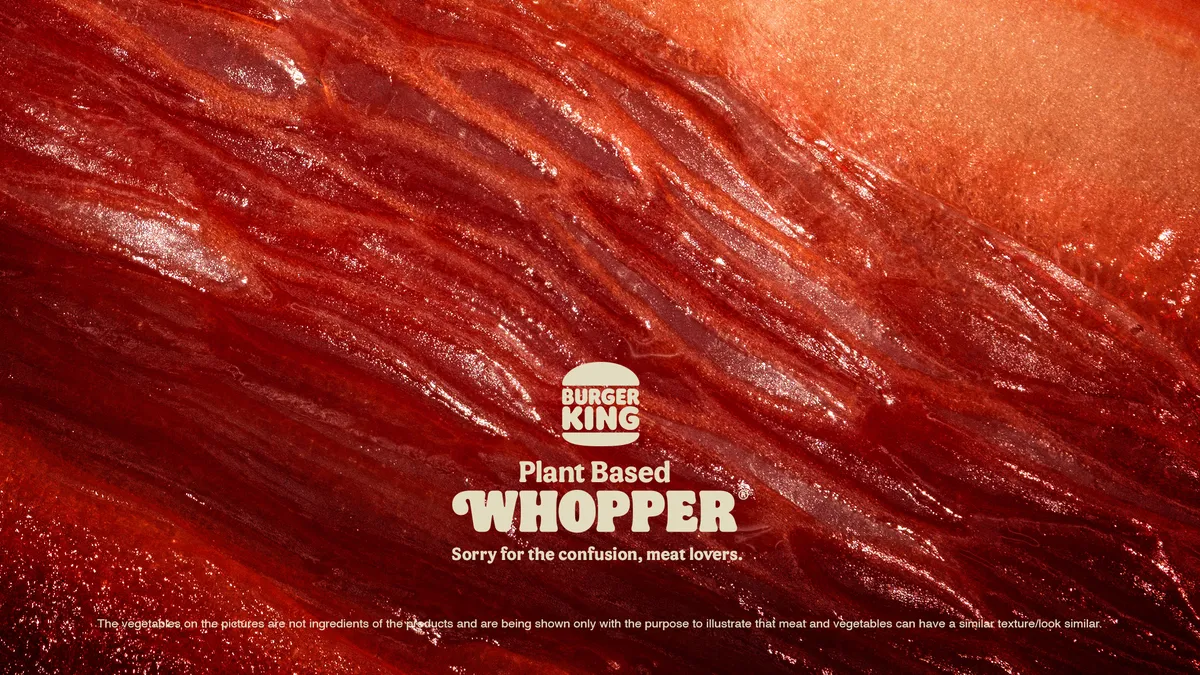After years of stratospheric growth, plant-based foods are expected to continue comprising a bigger share of menus, plates and stomachs, potentially growing from a $29.4 billion market in 2020 to more than $162 billion in 2030, per Bloomberg Intelligence. The shift has even impacted the QSR industry, with Chipotle and KFC recently following the lead of previous launches from McDonald's, Burger King and others by debuting plant-based offerings.
For QSR marketers, adding plant-based food to their menus presents an opportunity to attract younger consumers who are looking for food options that are better for their health and the environment.
"Restaurant brands that are trying to age down their brands, appeal to a younger generation of consumers or trying to reach consumers who are curious about health and the environment but don't want to sacrifice flavor, I think there's a way for plant-based meat to be integrated with almost any food service operation," said Zak Weston, senior supply chain manager at The Good Food Institute (GFI).
But marketing these products — whether made in partnership with industry leaders Impossible Foods and Beyond Meat, or formulated in-house — comes with its own set of challenges as chains look to stay true to their brands, consumer targets, menu offerings and back-of-house operations.
Marketing 'meat' to diners
Since the launches of Beyond Meat and Impossible Foods around the turn of the last decade, plant-based foods have worked to drive adoption by stressing not just their health and sustainability benefits, but how their tastes and textures resemble those of animal-based proteins.
Burger King's new "Meat?" campaign reinforces the chain's messaging around plant-based alternatives by toying with the visual similarities between meat and plants. In print and out-of-home ads, close-up images of what appears to be red meat are actually red pepper, beetroot and radicchio. Created by agency David Madrid and rolling out in Costa Rica, Mexico, Brazil and Germany, the campaign and its "Sorry for the confusion, meat lovers" tagline invites consumers to reconsider — and try — its Impossible Whoppers.
And even as QSR marketers have worked to keep up on health and environmental messaging — like how Burger King promoted the elimination of 120 artificial ingredients from its menu with its Keep It Real Meals — the flavor and food experience remains the key marketing imperative.
"There are a lot of really advantageous nutritional and health benefits, but you've got to be really careful about how you market as a restaurant brand, because if you communicate in some way that it's low in flavor or doesn't deserve to be on the menu alongside other animal-protein products as much, you're effectively hurting sales," Weston said. "We always advocate caution with health-forward, nutrition-forward messaging or sustainability messaging, unless that is really a core part of a restaurant's brand appeal with its consumers."
For example, Chipotle's launch of its plant-based chorizo has stressed that the product is made from fresh ingredients grown on a farm and not in a lab. In that way, the push of its plant-based protein is a natural extension of the chain's long-running efforts around sustainability and supporting farmers.
"Knock Chipotle if you want, but one thing is that they're pretty solid on food integrity, and they care about 'this farm serves this,' like Niman Ranch pork," said Dan Rowe, CEO of franchise development company Fransmart.
"We always advocate caution with health-forward, nutrition-forward messaging or sustainability messaging, unless that is really a core part of a restaurant's brand appeal with its consumers."

Zak Weston
Senior supply chain manager, The Good Food Institute
Marketing plant-based food is not a one-size-fits-all proposition. Chipotle's strategy will be different than that of competitor Taco Bell, for example, which has tested in-house proteins as well as those created with Beyond Meat.
To the latter point, restaurant partnerships with plant-based food companies have proved mutually beneficial, even as co-branded products in the QSR space are generally limited to team-ups with Coca-Cola and PepsiCo's Frito-Lay. Major chains like McDonald's and Burger King partnering with Beyond Meat and Impossible Foods, respectively, is a statement about the food brands' marketing value. As the market grows, co-branded products on menus could also prove to be a competitive advantage over animal proteins, as animal meat is essentially a brandless commodity.
"The fact that plant-based meat brands have been able to build such a strong consumer following and that their brand is so valuable that restaurants actually want to put it on the menu, the fact that it's actually driving sales, is pretty intriguing," Weston said.
The durability of the some early product launches, like White Castle's Impossible Sliders (which debuted nationwide in 2018), demonstrates how plant-based food is a fit for different consumer segments. While the food does appeal to baby boomers and Gen X, the demand for plant-based food is being driven by millennial and Gen Z, Weston explained.
"It's off the charts for younger generations, which really indicates this coming tidal wave of demand for these products, particularly with those consumers aging and having more purchasing power," he said. "As they become parents … millennials and Gen Z are going to be feeding their kids different things than they themselves grew up eating; they have very different dietary patterns."
Red flags and the future
Despite continued adoption by the restaurant industry, not all plant-based pushes are created equal. Dunkin' in 2020 tapped Beyond Meat ambassador and investor Snoop Dogg for a campaign that spotlighted its Beyond Sausage Sandwich, a product that was dropped from most restaurants the following year. Even industry experts who are bullish on plant-based foods highlight issues that restaurant brands must be wary of.
"Plant-based is going to be the next big thing in the [restaurant] industry, but the way that, like, KFC is doing plant-based, that's all bandwagon to me," Fransmart's Rowe said.
Restaurants that use the same fryer or the same grill for plant-based foods could undercut their offering with vegan or vegetarian diners who are concerned with cross-contamination, to say nothing of the cognitive dissonance with buying plant-based food at a chain that drives sales with animal products. McDonald's, for example, is currently dealing with a squabble over pork welfare — headlines that might distract from its McPlant push. Plus, despite their brand value, issues with Beyond Meat and Impossible Foods could also drag down restaurant efforts.
"There's a huge backlash right now on [Beyond and Impossible] because of all the additives," Rowe said. "People are starting to [ask], 'Is it really better for me? Is it really any better for the environment?'"
For some, the inclusion of plant-based proteins on menus is the latest iteration of better-for-you items that restaurant chains have added to menus for years, like earlier tie-ups with Weight Watchers and The Atkins Diet brands.
"It's kind of a veto vote: 'Let's add this to our menu, we can make a statement here about where we stand on sustainability, where we stand on health, and it gives us this halo,'" said Robin Blanchette, CEO of Norton, a creative agency focused on the hospitality industry.
"People are starting to [ask], 'Is it really better for me? Is it really any better for the environment?"

Dan Rowe
CEO, Fransmart
Like previous health-focused additions, Blanchette doesn't expect plant-based proteins to be a significant driver of sales — suggesting marketers should give this "shiny penny" the appropriate amount of attention.
"There's always a a percentage of the country that is going to want to try and do better, and I think this is part of it," she said. "When you look at menu mix and product mix, while people say they want to eat healthy, they really don't order that way."
Still, restaurants — after nearly two years of dealing with the pandemic — are facing labor, supply chain and inflationary issues, and every additional sale helps (those factors are affecting plant-based food companies as well). Like every part of the business, the pandemic likely disrupted launches in the plant-based food category; efforts by Chipotle, KFC and others could eventually help make up for lost time.
"Plant-based meats in particular were one of the hottest trends in the food service sector going into the pandemic, and we certainly expect that plant-based meats can play a big role in helping to rebuild volumes, attracting new consumers and retaining existing consumers in food service going forward in 2022," said GFI's Weston.
Plant-based meats are helping restaurant chains activate new day parts, occasions and consumer segments, and could also help marketers change the rules of preexisting battles; perhaps a plant-based chicken substitute could make waves in the chicken sandwich wars. No matter the form, QSR marketers must stay true to their brands and value propositions: offering food that is delicious, affordable and convenient.
"[Plant-based food] really has to be things that are available at the places [consumers] want to go, like being able to feed your child a plant-based Happy Meal," Weston said.























